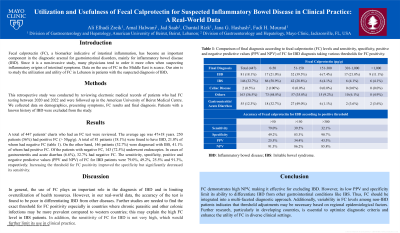Monday Poster Session
Category: IBD
P2575 - Utilization and Usefulness of Fecal Calprotectin for Suspected Inflammatory Bowel Disease in Clinical Practice: Real-World Data
Monday, October 28, 2024
10:30 AM - 4:00 PM ET
Location: Exhibit Hall E

Has Audio

Jana G. Al Hashash, MD, MSc, FACG
Associate Professor
Mayo Clinic
Jacksonville, FL
Presenting Author(s)
Fadi Mourad, MD1, Ali Elhadi Zreik, MD1, Amal Halwani, MD1, Jad Saab, BSc1, Chantal Rizk, MD1, Jana G. Hashash, MD, MSc2
1American University of Beirut, Beirut, Beyrouth, Lebanon; 2Mayo Clinic, Jacksonville, FL
Introduction: Fecal calprotectin (FC), a biomarker indicative of intestinal inflammation, has become an important component in the diagnostic arsenal for gastrointestinal disorders, mainly for inflammatory bowel disease (IBD). Since it is a non-invasive study, many physicians tend to order it more often when suspecting inflammatory origins of intestinal symptoms. Data on the use of FC in the Middle East is scarce. Our aim is to study the utilization and utility of FC in Lebanon in patients with a suspected diagnosis of IBD.
Methods: This retrospective study was conducted by reviewing electronic medical records of patients who had FC testing between 2020 and 2022 and were followed up at our tertiary referral center. We collected data on demographics, presenting symptoms, FC results and final diagnosis. Patients with a known history of IBD were excluded from the study.
Results: A total of 447 charts who had an FC test were reviewed. The average age was 47±18 years. Over half of the patients (56%) had positive FC ( > 50μg/g). A total of 81 patients (18.1%) were found to have IBD, 21.0% of whom had negative FC (table 1). On the other hand, 146 patients (32.7%) were diagnosed with IBS, 41.1% of whom had positive FC. Of the patients with negative FC, 143 (72.5%) underwent endoscopic evaluation. In cases of gastroenteritis and acute diarrhea (6.6%), 32.7% had negative FC. The sensitivity, specificity, positive and negative predictive values (PPV and NPV) of FC for IBD patients were 79.0%, 49.2%, 25.5% and 91.3%, respectively. Increasing the threshold for FC positivity improved the specificity but significantly decreased its sensitivity.
Discussion: In general, the use of FC plays an important role in the diagnosis of IBD and in limiting overutilization of healthcare resources. However, in our real-world experience, the accuracy of the test was found to be poor in differentiating IBD from other gastrointestinal diseases. Further studies are needed to find the exact threshold for FC positivity especially in countries where chronic parasitic and other colonic infections may be more prevalent compared to Western countries; this may explain the high FC level in IBS patients. In addition, the sensitivity of FC for IBD is not very high, which would further limit its use in clinical practice.
Note: The table for this abstract can be viewed in the ePoster Gallery section of the ACG 2024 ePoster Site or in The American Journal of Gastroenterology's abstract supplement issue, both of which will be available starting October 27, 2024.
Disclosures:
Fadi Mourad, MD1, Ali Elhadi Zreik, MD1, Amal Halwani, MD1, Jad Saab, BSc1, Chantal Rizk, MD1, Jana G. Hashash, MD, MSc2. P2575 - Utilization and Usefulness of Fecal Calprotectin for Suspected Inflammatory Bowel Disease in Clinical Practice: Real-World Data, ACG 2024 Annual Scientific Meeting Abstracts. Philadelphia, PA: American College of Gastroenterology.
1American University of Beirut, Beirut, Beyrouth, Lebanon; 2Mayo Clinic, Jacksonville, FL
Introduction: Fecal calprotectin (FC), a biomarker indicative of intestinal inflammation, has become an important component in the diagnostic arsenal for gastrointestinal disorders, mainly for inflammatory bowel disease (IBD). Since it is a non-invasive study, many physicians tend to order it more often when suspecting inflammatory origins of intestinal symptoms. Data on the use of FC in the Middle East is scarce. Our aim is to study the utilization and utility of FC in Lebanon in patients with a suspected diagnosis of IBD.
Methods: This retrospective study was conducted by reviewing electronic medical records of patients who had FC testing between 2020 and 2022 and were followed up at our tertiary referral center. We collected data on demographics, presenting symptoms, FC results and final diagnosis. Patients with a known history of IBD were excluded from the study.
Results: A total of 447 charts who had an FC test were reviewed. The average age was 47±18 years. Over half of the patients (56%) had positive FC ( > 50μg/g). A total of 81 patients (18.1%) were found to have IBD, 21.0% of whom had negative FC (table 1). On the other hand, 146 patients (32.7%) were diagnosed with IBS, 41.1% of whom had positive FC. Of the patients with negative FC, 143 (72.5%) underwent endoscopic evaluation. In cases of gastroenteritis and acute diarrhea (6.6%), 32.7% had negative FC. The sensitivity, specificity, positive and negative predictive values (PPV and NPV) of FC for IBD patients were 79.0%, 49.2%, 25.5% and 91.3%, respectively. Increasing the threshold for FC positivity improved the specificity but significantly decreased its sensitivity.
Discussion: In general, the use of FC plays an important role in the diagnosis of IBD and in limiting overutilization of healthcare resources. However, in our real-world experience, the accuracy of the test was found to be poor in differentiating IBD from other gastrointestinal diseases. Further studies are needed to find the exact threshold for FC positivity especially in countries where chronic parasitic and other colonic infections may be more prevalent compared to Western countries; this may explain the high FC level in IBS patients. In addition, the sensitivity of FC for IBD is not very high, which would further limit its use in clinical practice.
Note: The table for this abstract can be viewed in the ePoster Gallery section of the ACG 2024 ePoster Site or in The American Journal of Gastroenterology's abstract supplement issue, both of which will be available starting October 27, 2024.
Disclosures:
Fadi Mourad indicated no relevant financial relationships.
Ali Elhadi Zreik indicated no relevant financial relationships.
Amal Halwani indicated no relevant financial relationships.
Jad Saab indicated no relevant financial relationships.
Chantal Rizk indicated no relevant financial relationships.
Jana Hashash: Bristol Myers Squibb – Consultant.
Fadi Mourad, MD1, Ali Elhadi Zreik, MD1, Amal Halwani, MD1, Jad Saab, BSc1, Chantal Rizk, MD1, Jana G. Hashash, MD, MSc2. P2575 - Utilization and Usefulness of Fecal Calprotectin for Suspected Inflammatory Bowel Disease in Clinical Practice: Real-World Data, ACG 2024 Annual Scientific Meeting Abstracts. Philadelphia, PA: American College of Gastroenterology.
